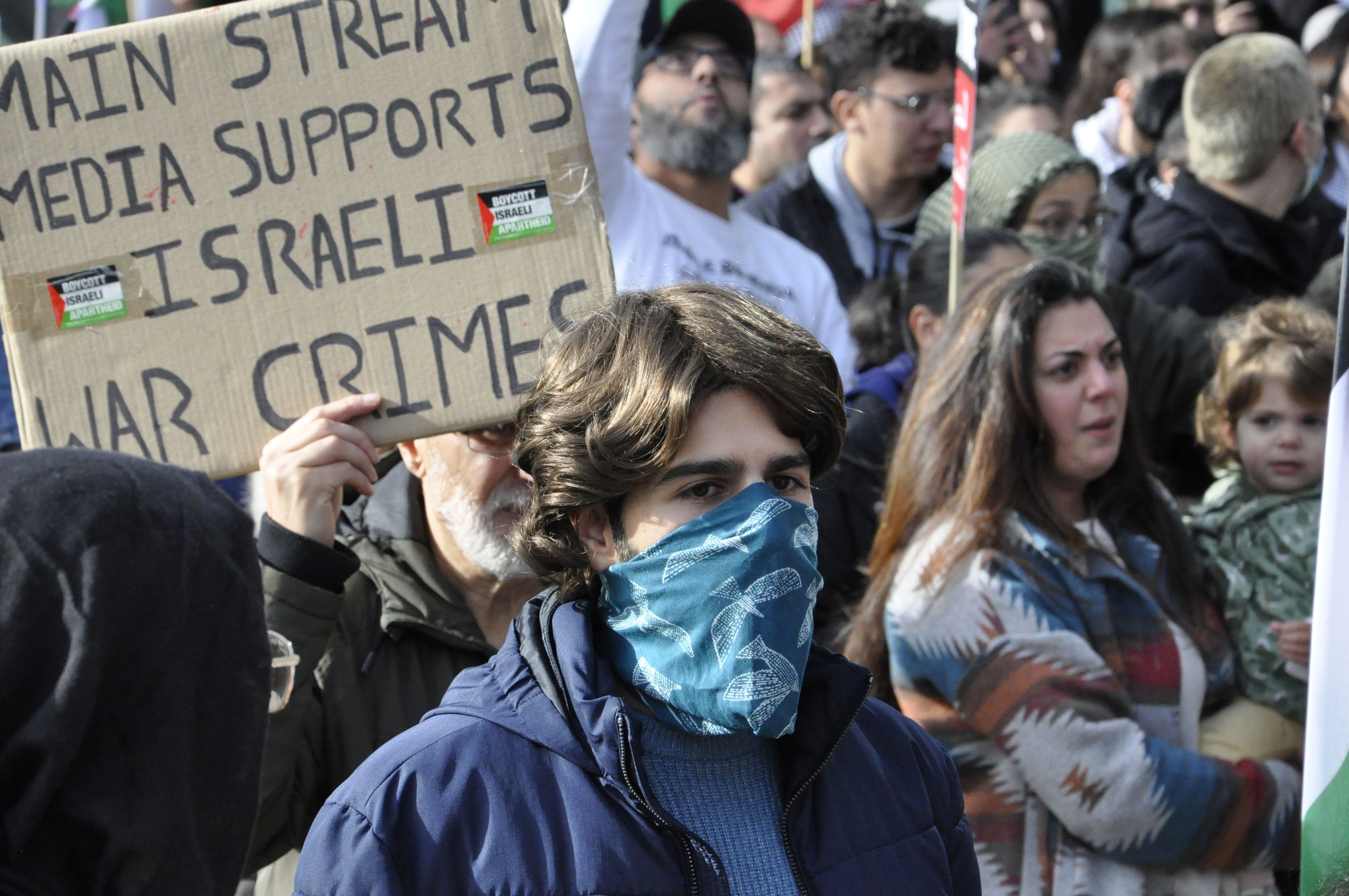في تشرين الثاني/نوفمبر 2024، وقّع أكثر من 100 موظف في هيئة الإذاعة البريطانية (بي بي سي) على رسالة موجّهة إلى مديرها العام، فيها انتقادٌ مباشر لتحيّز الهيئة للرواية الإسرائيلية وإخفاقها في اتّباع الرواية الموضوعية بشأن الجرائم الواقعة على الفلسطينيين في قطاع غزّة.
صاغَ تلك الرسالة كاريشما باتيل، الصحفية والمذيعة البريطانية التي حققت نجاحا كبيرا مع الهيئة خلال سنوات عملها القصيرة منذ خمس سنوات. وحين لم تحقق الرسالة الهدف المرجوّ منها، أعلنت باتيل استقالتها، بعد أن أدركت استحالة أي تغيير من الداخل، في الفترة الراهنة.
كان استشهاد الطفلة الفلسطينية هند رجب - مطلع العام 2024 - نقطة تحوّل أساسية في نظرة باتيل للهيئة وهي تحاول التغاضي عن القصّة، وفي نظرتها إلى نفسها وهي تدرك أنّها جزء من هذه الآلة الإعلامية السائدة في العالم الغربي، التي تقسّم العالم إلى "حديقة غربيّة" وإلى "أدغال" في أغلب بقية العالم (1).
ففي أوّل مقال لها بعد استقالتها، ذكرت باتيل كيف أن القسم الذي كانت تعمل معه في بي بي سي، اختار عدم تغطية القصّة في ذلك اليوم، رغم اقتراحها في غرفة الأخبار والإشارة إلى المعلومات الواردة من الصليب الأحمر بشأن مساعي إنقاذها. تقول باتيل: "لم يتغيّر ذلك القرار إلا بعد أن قتلت القوّات الإسرائيلية هند، وأصابوا السيارة التي كانت تقلها بوابل من 300 طلقة". وحتّى حين نشر الخبر أخيراً، فإن العنوان لم يوضّح هوية الفاعل وما فعل، وتجنبت المادة تقديم استنتاج بناء على الأدلة العديدة المتوفرة من مصادر مستقلة.
"لقد خذلت بي بي سي هند، كما خذلت أطفال فلسطين مرة أخرى حين سحبت الوثائقي الذي يحكي قصّة نجاتهم من الموت في غزّة"، تقول باتيل التي وقّعت مرّة أخرى على عريضة أخرى موجّهة للهيئة البريطانية، شارك في التوقيع عليها أكثر من 1000 شخصية إعلامية بريطانية وعالمية، تدين حذف الفيلم وتطالب بإتاحته للجمهور.

تقول باتيل: "لم يتغيّر ذلك القرار إلا بعد أن قتلت القوّات الإسرائيلية هند، وأصابوا السيارة التي كانت تقلها بوابل من 300 طلقة". وحتّى حين نشر الخبر أخيراً، فإن العنوان لم يوضّح هوية الفاعل وما فعل، وتجنبت المادة تقديم استنتاج بناء على الأدلة العديدة المتوفرة من مصادر مستقلة.
تؤكّد باتيل في مجمل مداخلاتها وتعليقاتها حول الحرب الإسرائيلية على غزّة وتغطيتها في الإعلام الغربي السائد، على وجود مستوى "صادم" من عدم الاتساق في تطبيق المعايير التحريرية بين الملفات والقضايا الراهنة؛ حيث يختلف المنطق التحريري في تغطية القصّة، بمجرّد اختلاف هويّة الأطراف المتفاعلين فيها، وحتى لو تطلب ذلك تجاهلَ الأدلّة الواضحة المتعمّد. أمّا السبب وراء هذا الخلل المهني والأخلاقي في غرفة الأخبار فيعود في رأيها أحيانًا إلى "المحاباة" العنصرية، وفي أحيان كثيرة إلى "الخوف" من الرقيب الإسرائيلي.
لقد خلقت هذه التحيّزات العميقة في الهيئة حالة "أورويليّة" في بيئة العمل داخل الهيئة - بحسب وصف باتيل - وبالأخص لدى الصحفيين الأصغر سنًا والصحفيين غير البيض، وهذا ما جعلها تقرر الاستقالة رغم النجاح الواسع الذي حقّقته في غضون سنوات قليلة في "بي بي سي"؛ ففي حديث لها مع صحيفة "ميرور" البريطانية، قالت باتيل إنها لم تطق "ازدواجية المعايير التي تُفرض على الصحفيّ عندما يتعلق الأمر بتغطية [قصص] الفلسطينيين".
لقد خلقت هذه التحيّزات العميقة في الهيئة حالة "أورويليّة" في بيئة العمل داخل الهيئة - بحسب وصف باتيل - وبالأخص لدى الصحفيين الأصغر سنًا والصحفيين غير البيض، وهذا ما جعلها تقرر الاستقالة رغم النجاح الواسع الذي حقّقته في غضون سنوات قليلة في "بي بي سي".
لقد تلّقت باتيل تحذيرات من إدارة الهيئة بشأن مشاركة منشورات عن غزّة على حساباتها الشخصيّة، إلا أنّها تذكر تجاهل الإدارة ذات السلوك من زملاء لها مؤيدين لإسرائيل، وهو ما دفعها بعد ملاحظة هذا النمط من التمييز والتحيّز إلى الاستقالة. وتوضح باتيل أنّ القرار لا يتعلّق بواقعة واحدة منفصلة، بل كان سلسلة من التجارب الصادمة، فيما يخص نطاقًا واسعاً من المسائل الحساسة، كقضايا المهاجرين وطالبي اللجوء والبيئة والعنصرية المنهجية. أما الحرب على غزّة فكانت هي النقطة التي حسمت قرارها على نحو قاطع. "لقد تنازلت بي بي سي عن مهمّة الصحافة في تتبّع الأدلّة التي ترد من قطاع غزّة ونقلها للجمهور بلا خوف من السلطة"، تقول باتيل في حوارها مع الناشط البريطاني أوين جونز، وهذا هو السبب المباشر لرفضها متابعة العمل مع الهيئة وفكّ الارتباط المهني بها.
لقد قتلت إسرائيل عشرات الآلاف من المدنيين في قطاع غزّة، من بينهم أطفال ونساء وشيوخ، وأطباء ومهندسون وممرضون ومعلمون، في سلسلة متواصلة من جرائم الحرب الموثّقة، والتي ساهمت في توثيقها مؤسسات بريطانية مستقلة، لطالما اعتمدت عليها بي بي سي في الماضي، لكنّها قررت تجاهل بياناتها لمجرّد أنّ الاستنتاجات المرتبطة بتلك الأدلة تدين "إسرائيل"، وأصرّت على توظيفها المبتذل لأساليب مواربة في التغطية، تشكّل خرقًا حتى للمعايير المهنية الداخلية التي ألزمت الهيئة بها نفسها.
في مجمل مداخلاتها وتعليقاتها حول الحرب الإسرائيلية على غزّة وتغطيتها في الإعلام الغربي السائد، توكد باتيل على وجود مستوى "صادم" من عدم الاتساق في تطبيق المعايير التحريرية بين الملفات والقضايا الراهنة؛ حيث يختلف المنطق التحريري في تغطية القصّة، بمجرّد اختلاف هويّة الأطراف المتفاعلين فيها
إلا أن باتيل تذهب أكثر من ذلك في نقدها تغطية بي بي سي للحرب على فلسطين، وترى أنّ الحاصل في سياق الإبادة الإسرائيلية لقطاع غزّة، هو مساهمة "في حرب المعلومات" من طرف الإعلام الغربي لصالح دولة الاحتلال، لا تقل في أثرها عن حملات التضليل الممنهجة التي تعجّ بها منصات التواصل الاجتماعي وترتبط بأجندات إسرائيل. لقد خلق ذلك - بحسب باتيل - "ضبابًا" كثيفًا يتشكّل من "حقائق بديلة"، تكاد تغطّي على كامل جسد الأدلّة التي توثّق الجريمة الحاصلة.
وبملاحظة هذا القدر الهائل من الأدلّة في سياق الإبادة الجماعية، ترى باتيل أنّ الالتزام حتى بتقديم رواية "كلا الجانبين" من الصراع، يعدّ شكلًا من التضليل والتواطؤ مع الجريمة. تقول باتيل:
“في كل يوم، أمرّ على أفظع الصور والمشاهد التي يمكن لأحد رؤيتها على الإطلاق. أتابع ذلك على حساباتي في "إكس" و"إنستغرام". أتصفّح ذلك وأحاول استيعابه بتأنٍّ، وأسجّل سيلاً من القصص المقترحة لأعرضها في اجتماع التحرير حول غزّة. كانت تلك المشاهد مثل طابعةٍ حارقة، تترك وسمًا مؤلمًا لا ينمحي من الذاكرة... وحين أرى كل هذه الأدلة القاطعة يومًا بعد يوم، ثم أتابع نقاشات [في غرفة التحرير] تتعامل مع سلوك إسرائيل باعتبار أنّه يحتمل وجهتي نظر متساويتين تمامًا، فإني استشعرت حجم تلك الفجوة الهائلة التي تفصل بين التزامي بنقل الحقائق وبين دوري كصحفية في بي بي سي.. لقد تجاوز الوضع الحاصل في قطاع غزّة المرحلة التي يمكن فيها قبول التعاطي مع الجدل حول جرائم الحرب والجرائم ضدّ الإنسانية. الأدلة أكثر من كافية، وتتيح التوصّل إلى استنتاجات جليّة وحاسمة بشأن ما ترتكبه إسرائيل، وبشأن طبيعة التغطية الإعلامية اللازمة لمواجهة ذلك".
تدعو باتيل في رسالتها وتعليقاتها الأخيرة حول الحرب المستمرة على غزّة إلى أن تعود الصحافة في بريطانيا إلى رشدها الأخلاقي والمهني، وأن تشكّل درعًا واقية ضدّ استمرار الحرب الإسرائيلية في فلسطين والوقوف ضدّ تكريس واقعٍ تسود فيه "الحقائق البديلة" وسط عتمة الإبادة الجماعية، ومقاربة ما يجري من عدسة الحقائق الموضوعية بدل التعامي المتواصل عنها.












































